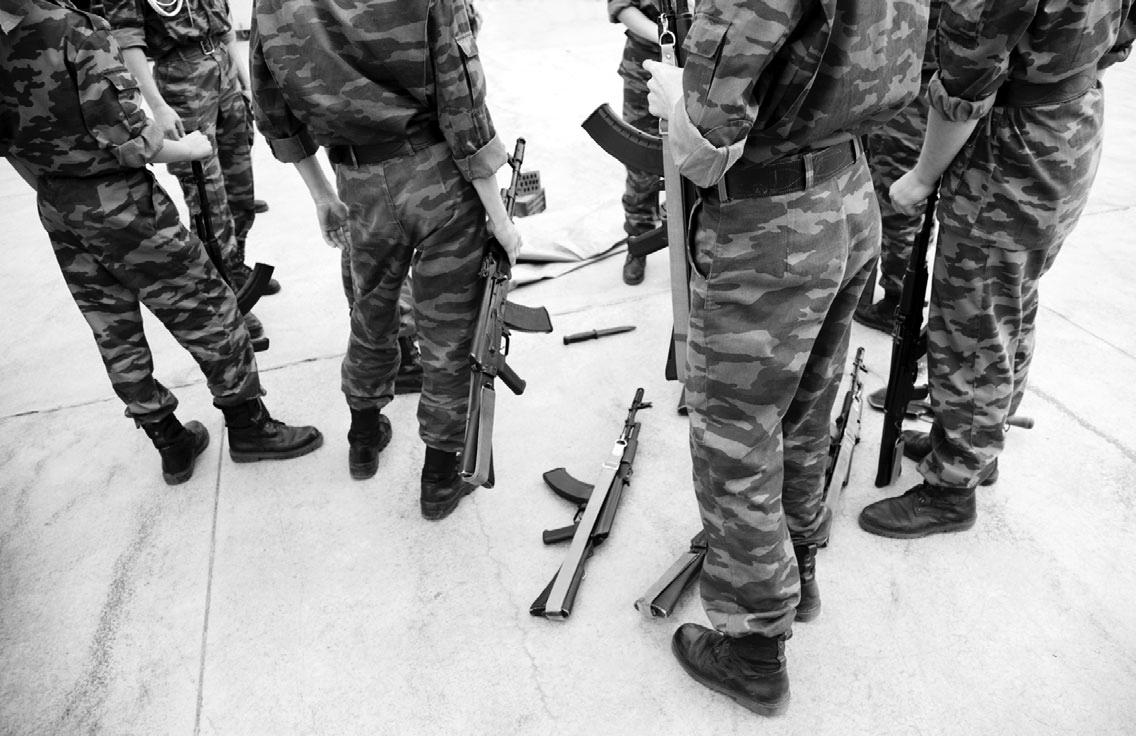 |
||
| ▲ A gun which has lost its owner was put on the ground. | ||
On July 14, the Korean army reported the death of 23 year old Private First Class Yuon as a result Sergeant Lee. The victim was severly beaten and in the process struck in the chest, later causing a chunk of food to lodge in his airway, and as a result, Pte. Youn died of asphyxiation. Investigation of the incident revealed there were many complaints lodged against Sgt. Lee in the past.
A Custody Sergeant is responsible for classifying enlisted soldiers who are having difficulty adapting to military life because of psychological problems and as a result, require special care. The Custody Sergeant System was initiated to help soldiers adapt to military life during their service period. It also aims to solve personal problems of enlisted soldiers relating to health, family, sex, and economic issues with unit superiors.
How are soldiers ‘at risk’ classified? The affected personnel are classified into three groups, from A to C, as defined by Item 941 of Art. 24 of Army Regulations. Grade Level C, is the lowest level, and is called ‘basic control target.’ It includes soldiers who have joined the army less than 100 days ago and those in feeble health. B grade level is for ‘priority control targets.’ These are soldiers with mental disorders or are from a broken home, those with physical defects, and a potential for regulation violation relating to sex, physical or harsh acts of violence. Lastly, A grade soldiers are at the highest risk level, and are referred to as ‘special control targets.’ These are soldiers at risk of suicide, a homosexual or the highest level of troublemakers. A soldier’s classification is determined by a physical examination by the Military Manpower Administration before joining the army, and also determined by a personality test, and interview with a commander conducted during the early period of enlistment in the army.
To avoid the next Private Yuon accident, the government should work to develop a fundamental solution to the problem of bullying and stress in military life. The Dankook Herald (DKH) interviewed Lee Il-woo. (Director, of The Korean Defence Network) KDN a civic group working to strengthen the national defense force and human rights in the barracks. “Without victims or thirdparty declarations, it is impossible to hear about the absurd or harsh treatment soldiers undergo in the barracks. Thus the military authority has to implement one-on-one discussions with senior officers and soldiers, letter systems that ensure secrecy about a solider’s agony and basically more systems for the soldiers that are going on now. However, the soldiers are worried about being branded as a traitor and most of them aren't used those kinds of systems,” he said about the reason why victims don’t readily seek relief from suffering more quickly.
DKH asked what fundamental solutions (such as reinforcement of personality education) can be put forward to solve problems in the army. “There are three big reasons why violence occurs in the military. First, the nonexistence of personality education in the home and school, second, populist pledges of political parties to reduce the length of compulsory military service leads to an average lack of manpower of 60000 people in the military every year. Third, the low qualifications of military officials leads to a more unprofessional environment. To solve these problems, schools and families have to take responsibility for the personality education of children, In addition, the government should re-establish the 24 month length of compulsory military service. If that is impossible, then the government should increase the defense budget and outsource noncombatants to address their manpower shortage problems. Finally, providing better treatment for military officials could attract higher quality leaders to apply to become military officials. They might be nicer to the soldiers,” he answered.
DKH said. “When people are in the army, most of them have a strong tendency to contempt and loathe people who are not good at group training, exercise and work. DKH reporters think this atmosphere results in the classification of a soldier ‘at risk’ or in need of special attention.” He replied, “Most people don't get listed, but those who were problems before they entered the army continue to be so once they enlisted. Sharing one's suffering and troubles with other members can usually help them form a sense of fellowship. Anyone willing to work well and play soccer well has a lower possibility of making the list of soldiers requiring special attention or outcasts in the army. I should emphasize that the root cause of beatings and bad behavior in the army is a direct result of the system’s failure to filter out troublemakers. The army itself doesn't create mean-spirited natures in its soldiers nor does it encourage maximizing violence. It is foolish to find blame only in the barracks. If we do not change our problems in society or at home, a second, or even third Private Yuon will appear.” With the director’s answer emphasizing personality education, DKH ended the interview.
On August 11, two other soldiers identified as requiring special attention, members of the 28 Division, were found dead in an apartment in Sando-dong, Dongjak-gu, Seoul. The army and investigation officials listed the deaths as suicide because they had previously been identified as level A ‘at risk’ soldiers. If the government or the army took concrete steps to address the current problems with ‘at risk’ soldiers, the tragedy would not have happened. The victims are our family or friends, so citizens must work with the government to find solutions. It is time to solve the problems of the army and to accomplish this we need the efforts of not only the government and military authorities but also the people.
Choi Na-yeon,Seo Yoo-jung,Kwon anhj12261226@gmail.com

![[Campus Magnifier] Let's Surf the Library!](/news/photo/202404/12496_1765_4143.jpg) [Campus Magnifier] Let's Surf the Library!
[Campus Magnifier] Let's Surf the Library!
![[Campus Magnifier] Let's Surf the Library!](/news/thumbnail/202404/12496_1765_4143_v150.jpg)





